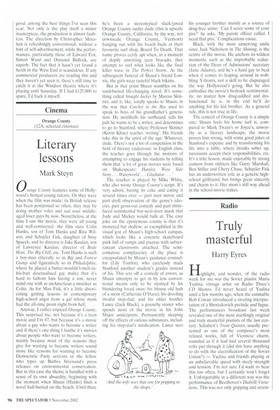Literary lessons
Mark Steyn
0 range County features some of Hollywood's hottest young talents. Or they were when the film was made: its British release has been postponed so often, they may be doing mother roles and sad sour middleaged loser guys by now. Nonetheless, at the time I saw the movie, they were all young and well-connected: the film stars Colin Hanks, son of Tom Hanks and Rita Wilson, and Schuyler Fisk, daughter of Sissy Spacek, and its director is Jake Kasdan, son of Lawrence Kasdan, director of Body Heat. The Big Chill, etc. Tom Hanks is such a boy-man (literally so in Big and Forrest Gump and figuratively so in Philadelphia, where he played a butter-wouldn't-melt-inhis-butt desexualised gay male) that it's hard to fathom him having a son, never mind one with as unAmerican a moniker as Colin. As for Miss Fisk, it's a little disorienting getting lessons in contemporary high-school angst from a gal whose mom had the all-time prom night from hell.
Anyway, I rather enjoyed Orange County. This surprised me, not because it's a teen movie and I'm 87, but because it's a movie about a guy who wants to become a writer and if there's one thing I loathe it's movies about people who want to become writers, mainly because most of the reasons they give for wanting to become writers sound more like reasons for wanting to become Democratic Party activists or the fellow who types up Barbra Streisand's press releases on environmental conservation. But in this case the theme is handled with a sense of its own absurdity, beginning with the moment when Shaun (Hanks) finds a novel half-buried on the beach. Until then, he's been a stereotypical slack-jawed Orange County surfer dude (this is upscale Orange County, California, by the way, not downscale Orange County, Vermont) hanging out with his beach buds at their favourite surf shop, Board To Death. That name proves eerily apt when, in a moment of clopily unwitting teen bravado, they attempt to surf what looks like the final killer wave in The Perfect Storm. At the subsequent funeral of Shaun's friend Lonnie, the girls wear tasteful black bikinis.
But at that point Shaun stumbles on his sand-buried life-changing novel. It's something called Straight Jacket by Marcus Skinner, and it, like, totally speaks to Shaun, in the way that Catcher in the Rye used to speak to boys of his grandfather's generation. He mothballs his surfboard, tells his pals he wants to be a writer, and determines to go to Stanford, where Professor Skinner (Kevin Kline) teaches 'writing'. His friends take this in the spirit of the age: Whatever, dude. There's not a lot of competition in the field of literary endeavour: in English class, the teacher goes through the motions of attempting to engage his students by telling them that 'a lot of great movies were based on Shakespeare: Hamlet, West Side Story . . Waterworld Gladiator . '
The teacher is played by Mike White, who also wrote Orange County's script. It's very adroit, having its cake and eating it several times over — part teen movie and part droll observation of the genre's idiocies, part gross-out comedy and part shinyfaced sentimental boy-next-door mush that Judy and Mickey would balk at. The easy joke on the eponymous county is that it's moneyed but shallow, as exemplified in the visual jest of Shaun's high-school campus, which looks like a concrete skateboard park full of ramps and piazzas with subterranean classrooms attached. The semicomatose complacency of the place is encapsulated by Shaun's guidance counsellor (Lily Tomlin), who carelessly mails Stanford another student's grades instead of his. This sets off a comedy of errors, as Shaun attempts to get in by less conventional means only to be stymied by his blundering loved ones: his blousy old lush of a mom (Catherine O'Hara); his drooling invalid step-dad; and his older brother Lance (Jack Black), a paunchy stoner who spends most of the movie in his John Major underpants. Permanently sleeping off the effects of various substances, including his step-dad's medication, Lance sees
■ ••■• • a a
his younger brother mainly as a source of drug-free urine: 'Can I score some of your piss?' he asks. 'My parole officer called. I need that piss.' Complications ensue.
Black, with the most unnerving smile since Jack Nicholson in The Shining, is the centre of the movie. He anchors its wildest moments, such as the improbable seduction of the Dean of Admissions' secretary (Jane Adams), and he's a hard guy to beat when it comes to leaping around in wobbling Y-fronts, not a skill to be disparaged the way Hollywood's going. But he also embodies the movie's bedrock sentimentality: no matter how drug-addled and dysfunctional he is, in the end he'll do anything for his kid brother. As a general rule, this is not true in life.
The conceit of Orange County is a simple one: Shaun feels his home turf is, compared to Mark Twain's or Joyce's, unworthy as a literary landscape; the movie proves him wrong, with some good jokes at Stanford's expense and by transforming his life into a fable, where drunks sober up, narcissists accept their responsibilities, etc. It's a trite lesson, made enjoyable by strong cameos from oldsters like Garry Marshall, Ben Stiller and Chevy Chase. Schuyler Fisk has an underwritten role as a generic highschool girlfriend, but brings great sincerity and charm to it. Her mom's still way ahead in the school-movie stakes.


















































































































 Previous page
Previous page